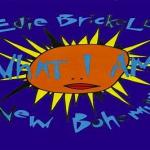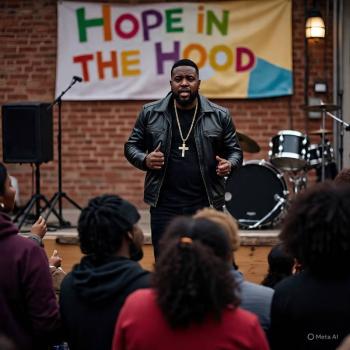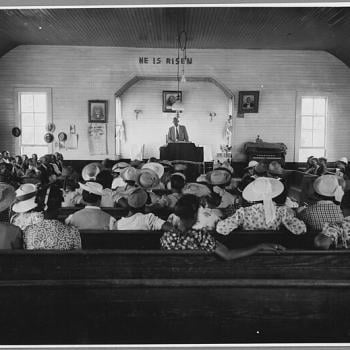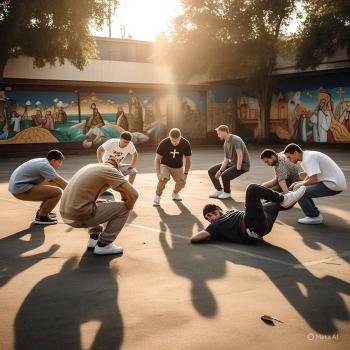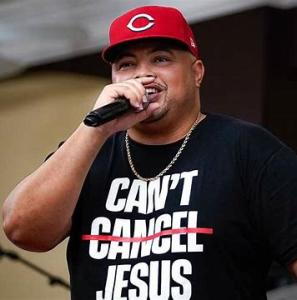
Few Christian Hip Hop artists can connect the lyrical poetics of both roots of Hip Hop and Christian doctrine. Bizzle stands out as an example of this process. Framing his work on his personal/spiritual/ministry philosophy of “God Over Money,” Bizzle situates his work at the intersection of these fruitful elements. Staging his testimony as the backdrop of his work, Bizzle functions at the core principles of Christian Hip Hop: testimony, scripture-centered, discipleship, and evangelism. Flowing comfortably between trap Hip Hop style and a traditional MC style, Bizzle illustrates the ability and necessity to speak to both faith-based and non-faith-based audiences. The inclusion of trap Hip Hop vocal style gives Bizzle the space for his lyrics to flow unconstrained by the beat. The lyrics become transparent as they are elevated over the electronic beats, synth layers and well-placed samples.
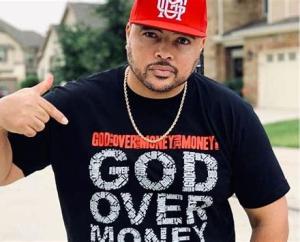
Street Preaching To Testify
This track comes from the “Crown and Crosses” album. The track positions gangster culture in contrast to salvation. The metaphor of the ‘king” is positioned both as gangster culture juxtaposed with the King – Jesus. Bizzle includes an urban landscape, referring to the hood, as the visual supplement to point direct attention to the content of the work. He includes his signature “God over Money” at the onset situating how this makes him “wealthy” over all oppressive forces. From here both he and H.U.R.T. explore the metaphor of the hood as “king” (read: appropriation of gangster culture) signifying the King, Jesus, with lyric reference and physical pointing (read: praising) upward. The subtle yet prominent physical expression in humility to the King situated in the hood speaks to those in these lived experiences seeking a way out from under socio-economic oppression. This is a bold step for a Christian Hip Hop artist. What Bizzle frames is the immediate importance to speak beyond abundant Christian Hip Hop artists who produce works that speak to a believer audience. Bizzle pushes against these definitions making the important note that Hip Hop can serve as an evangelic tool. Hip Hop becomes a resource for personal salvation. The audience is not limited to Christian/faith-based listeners. Bizzle expresses the importance for those outside these borders to hear the message, founded fundamentally in Hip Hop, as an invitation to accept personal salvation from the King.
Speaking Across the Discourse
The architectonic progression of Bizzle’s work follows a formula he compounds in his works. Bizzle frames his work in a socio-religious context. Opening with an expression of the environment for the lyrics to reside, the works then build through two to three verses each divided with a simple hook. How Bizzle develops this form is through the length of his hooks. These serve as a short interlude within the larger framework. Changing the sonic texture and vocal range gives the listener the audio cues that this is a separate and important point in the work. Bizzle does not close his works with the time-honored repeated hook. He uses this postlude area to profess his ministry statement as an opportunity to evangelize to the listener who, by this point, is caught in the composite musical landscape. Bizzle is not afraid to engage different Hip Hop styles to convey his message. In concert with classic Hip Hop MCs, Bizzle constructs the musical environment to support the lyrics, rather than the lyrics working to fit into a Hip Hop industry marketing standard. For those new to Christian Hip Hop, this application opens the dialogue for scripture-based testimony and evangelic discourse to be heard and understood.
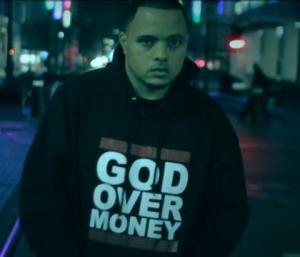
Self As Subject
Bizzle positions himself as the subject of his works. Historically, this level of work requires a sensitive incorporation. This strategy flirts with over-indulgent, self-referential, essentialization of the content. Careful overarching crafting, lyrical placement, and clear scripture-focused content moves Bizzle’s message from the assumed angle of self to one allowing the listener to pivot from personal assumptions and connect with his evangelic expression.
Bizzle’s “Testimony” is his evolution as a Hip Hop artist, falling, and coming to be a strong force in Christian Hip Hop. Following a critical theory analysis of self as a subject Bizzle carefully explains his own lived realities and the complications of his struggles removing himself from a ghetto-ethic to a biblically-centered artist. Reviewing this testimony brings to light the contemporary apologetic reading of Hip Hop culture Bizzle remains committed to promote. He discusses how his “God over Money” concept was born and the devotion to this scripture-based foundation. The testimony articulates his socio-religious contextualization of Hip Hop as agency for salvation. Providing audiences with this narrative is firm evidence of the power for a street evangelist, disciple-focused, scripture-centered, socio-religious devoted ethic. Remaining true to his personal philosophy, this testimony is an honest bold step as a border crossing agent for non-Christian/non-faith-bashed audiences while capturing what Bizzle outlines as “real love” for God.
Narrating Love
This Ain’t Love, Featuring Lavoisier and Sevin
This track is a hard gesture to the turning point in funk as Hip Hop is being born. The orchestral samples and acoustic instruments position this work at the core of this classic 1970s era. The lyrics weave a tapestry founded on discipleship and personal salvation. Lavoisier and Sevin add to the discourse of personal testimony with a street evangelic approach. In company with Bizzle’s other works, the visuals play an integral part telling a story unto itself. The shady filming of the video is a tip to the early evolution of music videos and prime time television programing of the 1970s. Keeping the environment secure in the hood, the three MCs speak to and from this lived experience. The verse of each repositions “love” from a physical experience to that of spiritual Love from God. The street evangelic approach of this track is powerful. Situating visuals and music at a turning point in pop music foreshadows the coming Hip Hop genre. Capturing each of these cultural signifiers and positioning these squarely in a street disciple/evangelic discourse border crosses between Christian/faith-based and non-Christian/non-faith-based audiences.

Talking Back
Contextualizing Bizzle in the sphere of Christian Hip Hop articulates the foundations of what makes this sub-genre of Hip Hop critical. Bizzle fuses his personal testimony throughout the works he builds integrating an apologetic lyric discourse. The evangelic tone of his lyrics do not negate attention to the beat or flow of the track. His scripture inclusion is present without being overly aggressive. The collection of these elements – testimony, scripture founded, and an evangelic/apologetic posture – in Bizzle’s work embrace the elements of roots Hip Hop: cut/mix, rupture/flow, and layer. Visually and lyrically, Bizzle in involves both creating a voice with the ability to speak to Christian/faith-based and non-Christian/non-faith-based audiences.
The track “Dear Hip Hop” personifies Hip Hop as his savior while living in a ghetto-centered environment. The verses follow an acceptance of Hip Hop’s direction for life framed by a gangster Hip Hop posture. The twist is when Bizzle questions Hip Hop’s intent to provide for him. Gang violence, the prominence of money, a broken family environment, violence against women, and the absence of a firm grounding are each pushed to the forefront of Bizzle’s complication with how Hip Hop is and will “save” him from socio-economic oppression. Keeping the video in black and white codifies the binary of culture appropriation; gangster culture or an alternative life to be honestly “saved.” There is no middle ground to follow, no compromise between the two agents. Using a youth who physically narrates his persona throughout in a construction of gangster culture signifiers is equally a deconstruction of identity walking away from “salvation” to the vacant promises of Hip Hop. This work is a powerful socio-religious deconstruction of Hip Hop identity that inverts the narrative to follow a path of salvation. The singular road the youth walks talks to the one path God has given to Bizzle with his work as a Christian Hip Hop artist. The consistency of a street preacher, ghetto evangelist trajectory is not lost in this very subtle work. The binding of visual and lyrics cultivate a voice for salvation which those actively listening will hear.
Working Outside, Remaining Inside
What sets Bizzle aside from other Christian Hip Hop artists is his persistent use of secular Hip Hop themes, gangs, drug culture, mysogony, and money and fame. Bizzle does not stray away from these themes like other Christian Hip Hop artists. This consistent use underscores his testimony as an evangelic tool for the audience. This operation brings the listener into the conversation without overwhelming scripture or biblical verses. Non-Christan/non-faith-based listeners will be more apt to hear Bizzle’s work and embedded message noting the transparency of his faith while pointing directly to socio-political issues. The videos use relevant community environments to further associate his message with those outside of the Christian Hip Hop context. This is not a new technique, but when we align the visual with the lyric, Bizzle becomes a street evangelist par none.



